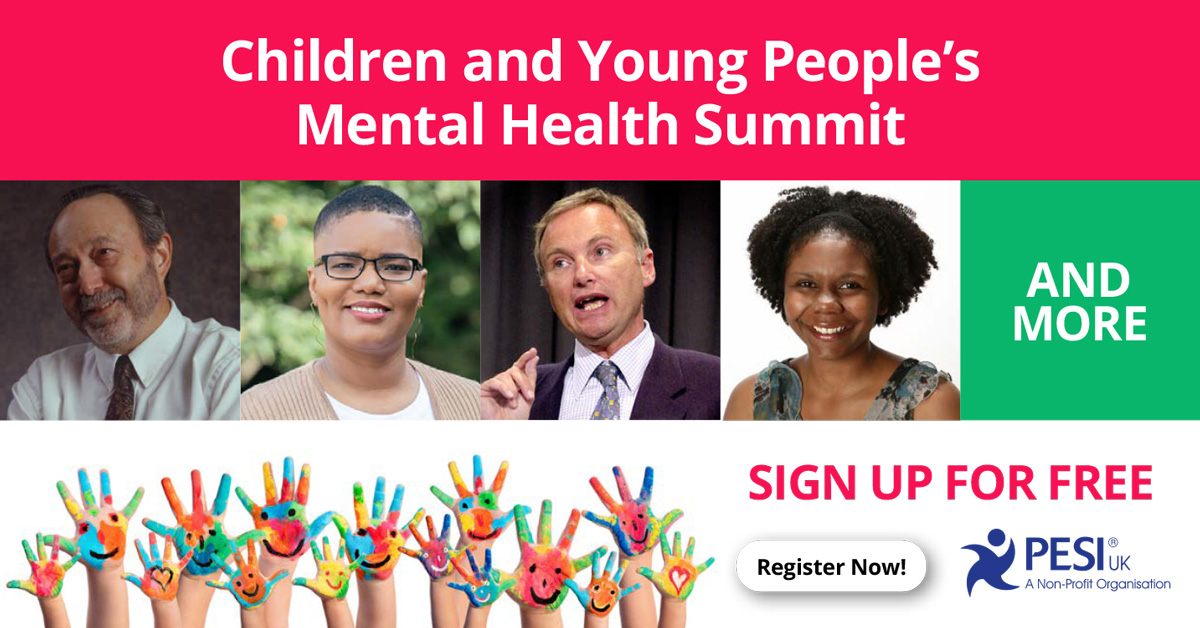Leading Clinicians and Thought Leaders on Stress, Uncertainty and Resilience
What impact might Covid-19, and systemic racial injustice, be having on young people? How can we help them feel safe in these uncertain times? What challenges – and opportunities to do things differently – might lie ahead? This month, PESI UK will be asking some of the world’s top clinicians and thought leaders as part of a free, three-day Children and Young People’s Mental Health Summit. Join Peter Levine, Stephen Porges, Barnardo’s CEO Javed Khan and others for nine free discussions on the most pressing topics in children’s mental health.

The world of 2020 is not an easy one to be growing up in. In one sense, the global pandemic has violently interrupted the narratives of children’s lives, robbing them of structure, social relationships, and fundamental rites of passage. For some, Covid-19 has brought actual bereavement. Others have experienced abstract losses that may be harder for them to apprehend.
Meanwhile, society is beginning to awaken to the reality of systemic racial injustice. This highlights the need for better support for children from communities of colour, better understanding of the impact of intergenerational and transgenerational trauma – and for young people from all ethnic groups to be supported to engage with challenging conversations.
Taking place online from August 26-28, PESI UK’s Children and Young People’s Mental Health Summit: ‘Empowering young people with resiliency to thrive during times of stress and uncertainty’, will be calling on some of the world’s top clinicians to suggest how therapists, teachers, parents and others can best help younger generations at this time. In a special panel discussion on Friday August 28 (4-5pm), we’ll also be joined by the CEOs of three leading charities to reflect on the provision of support for young people, including how the ‘new normal’ could include a more holistic and visionary approach.
How do children adapt to traumatic experiences? How might this inform our approach to helping young people in the era of Covid-19? Among the expert speakers from the clinical sphere will be two top names in trauma work.
Bestselling author and founder of Somatic Experiencing, Peter Levine, will join us on Thursday August 27 (4-5pm) to discuss the role of adults as regulatory figures, and how we can help children tap into, and develop, an innate natural resiliency.
Dr Stephen Porges will also be offering insight into the state of young nervous systems in the era of Covid-19. On Wednesday August 26 (4-5pm), the developer of Polyvagal Theory will discuss the pandemic, and experiences of racism, in terms of safety, danger and threats to life. How can an understanding of the vagus nerve help us address their impact?
Of course, specific groups need additional, specialised support at this time. Tony Attwood, a leading voice on Asperger’s Syndrome, will be addressing the potential affects of lockdown on children with Autistic Spectrum Conditions and ADHD (Friday August 28, 12noon-1pm). Meanwhile, we’ll be exploring the interplay between experiences of racism and developmental trauma with psychologist Eboni Webb (Friday August 28, 2-3pm).
Attachment theory can also help us understand why children may be demonstrating varying capacities to cope with these crises. Attachment and trauma professional Christina Reese will offer insight in to the additional challenges posed by sudden school closures, social distancing and lockdown for children with insecure attachments (Thursday August 27, 12noon-1pm).
One coping mechanism young people are increasingly turning to in this time of anxiety, uncertainty and social isolation is gaming. Nicholas Kardaras is a psychologist and addiction expert, and the author of Glow Kids: How Screen Addiction is Hijacking Our Kids. At a time when parents are increasingly resorting to screen time as a ‘digital babysitter’, we’ll be asking him how compulsive technology use affects developing minds (Thursday August 27, 2-3pm).
Of course, big emotions are a natural response to big world events. Normalising young peoples’ responses – and accepting our own – may be crucial at this time. Janine Halloran, author of the Coping Skills for Kids Workbook, will share ways to help young people manage anxiety, stress and anger (Wednesday August 26, 12noon-1pm). Speaking to the stress of the caregiver, Alexia Rothman will explain how an Internal Family Systems approach can help adults to approach conflicts, emotional curveballs and chats about difficult subjects with calmness, honesty and self-compassion (Wednesday August 26, 2-3pm).
Finally, our summit will draw to a close with a special panel discussion (Friday August 28, 4-5pm) featuring the CEOs of three leading charities – Javed Khan of Barnardo’s, Catherine Roche of Place2Be and Victoria Hornby of Mental Health Innovations. As classrooms prepare to reopen, we’ll look at what is being done to support mental health and tackle racial injustice in schools. The CEOs will be talking key learnings, challenges and priorities for the Covid-era. But we’ll also be ending on a hopeful note, and considering whether it offers us a crucial opportunity to rethink the system.
When it comes to children and young people’s mental health, extraordinary times call for informed collective thinking. Join these leading voices to consider what we can all do to help.
The PESI UK Childen and Young People’s Mental Health Summit will take place from August 26-28. Visit this page for the full line-up and details of how to register. We have to limit the capacity for these online events to 3,000 per webcast – so we advise advance booking to avoid disappointment.